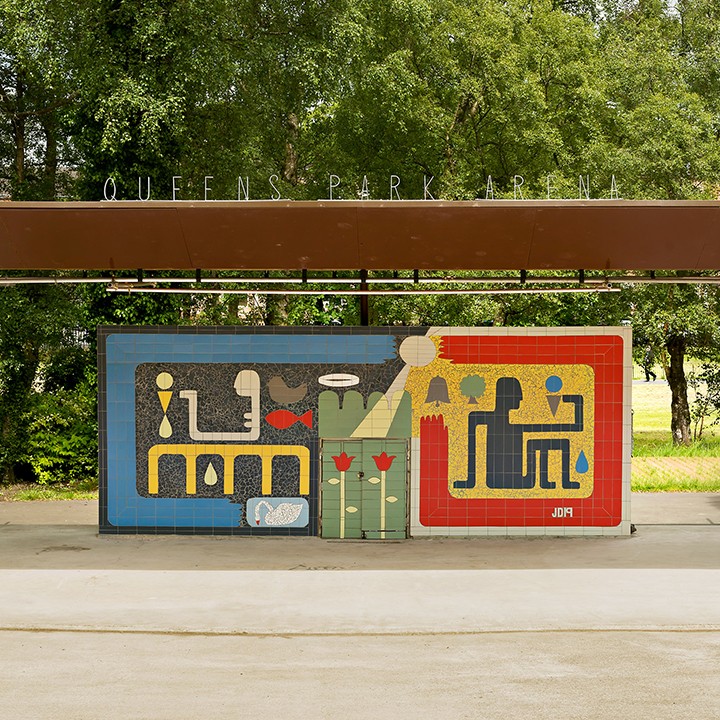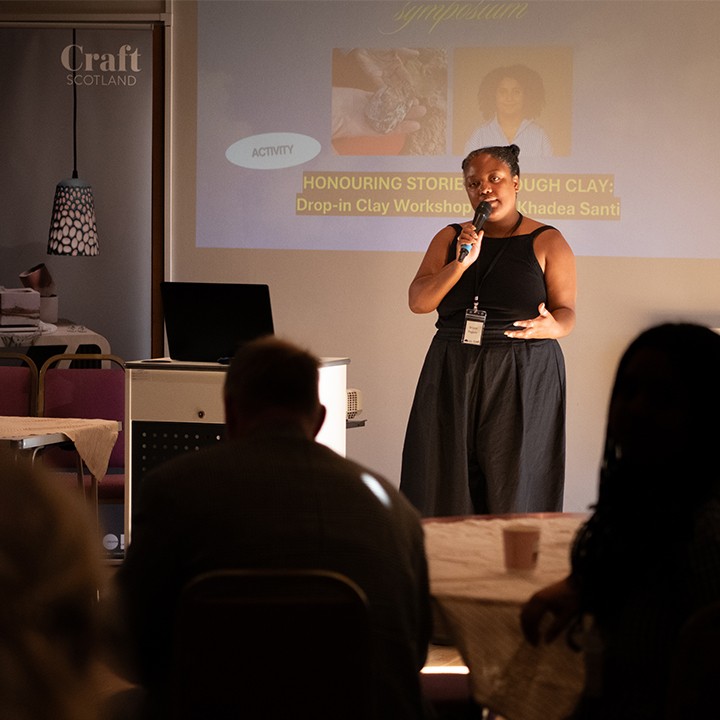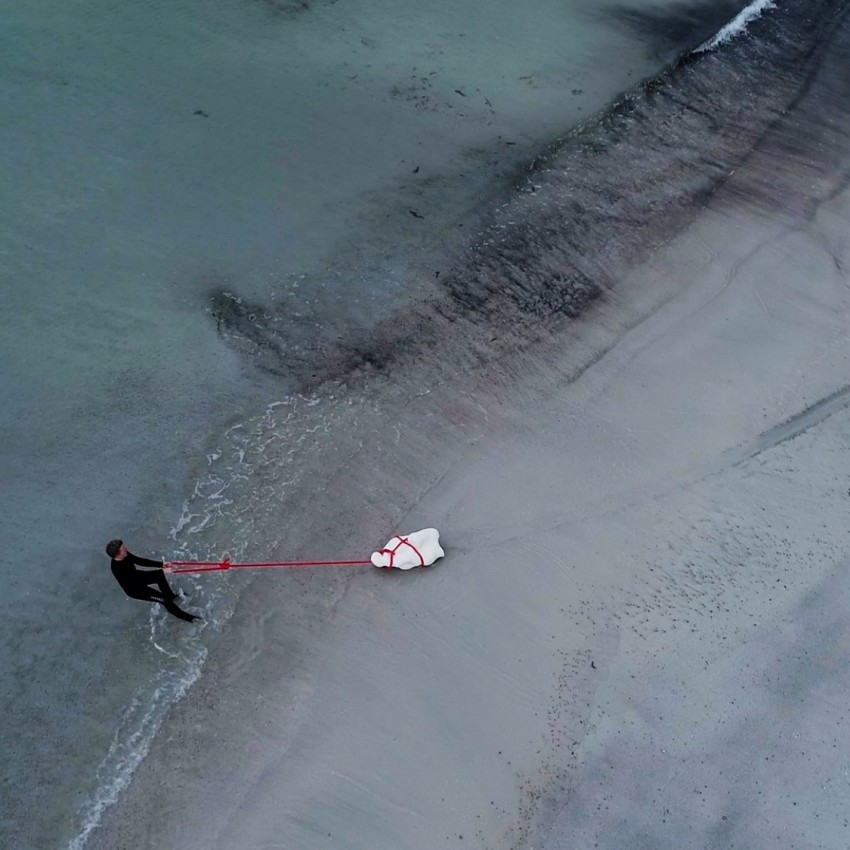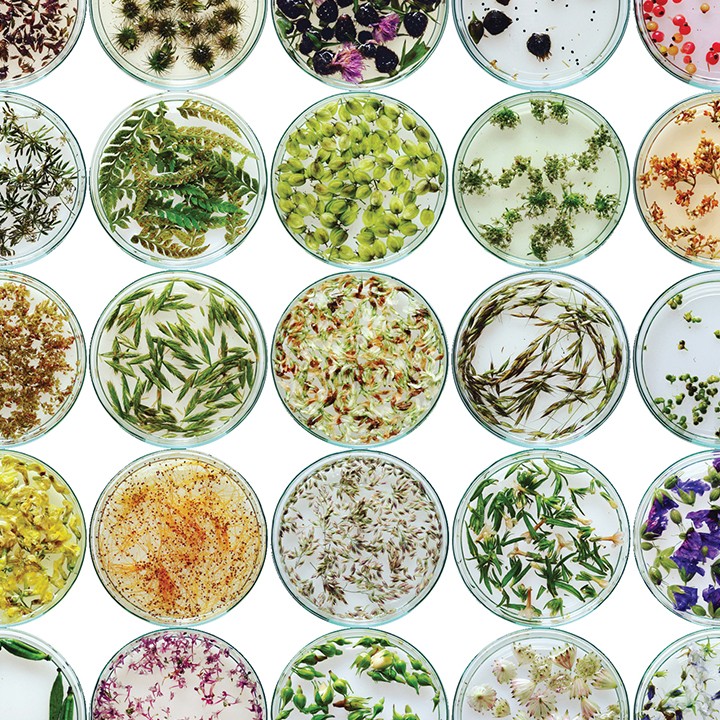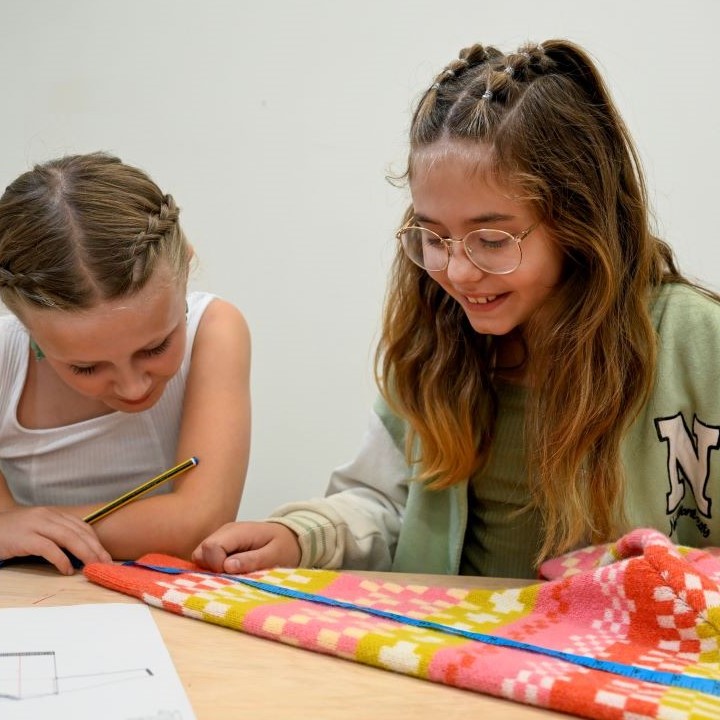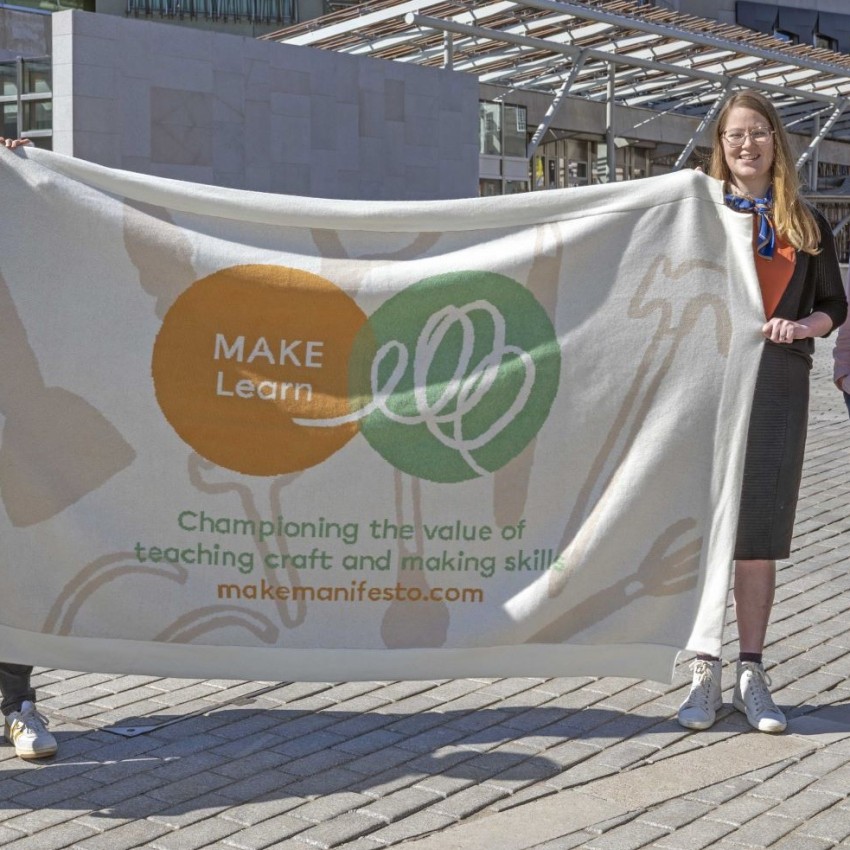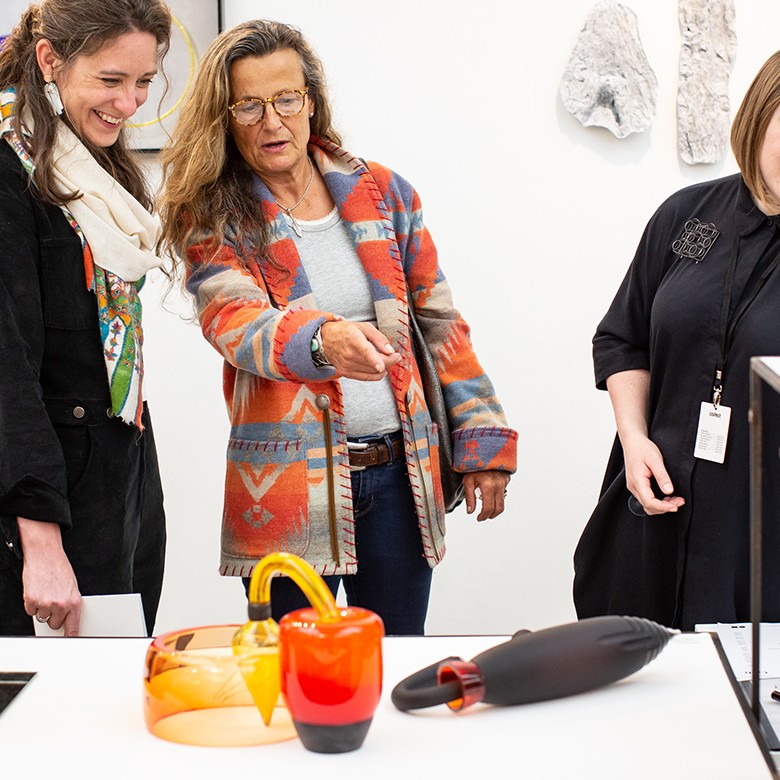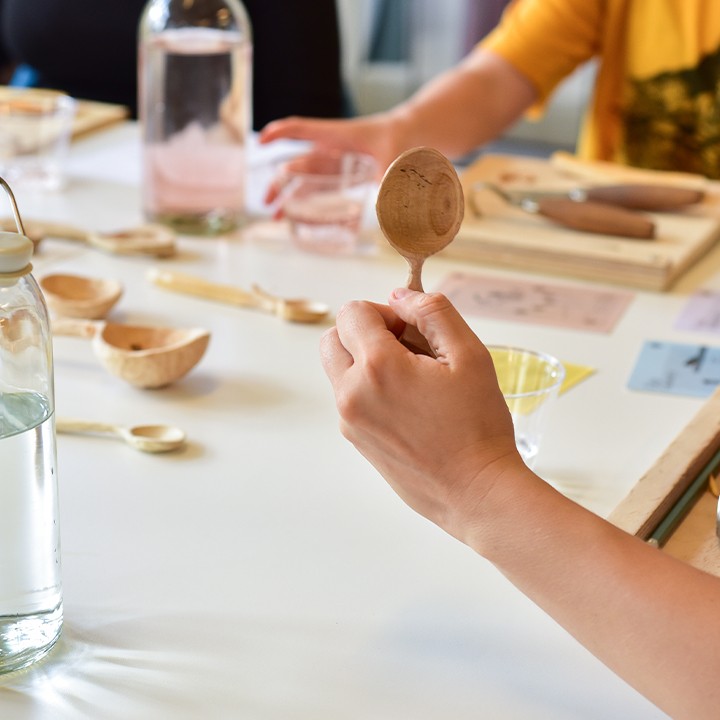Craft is both an artform and an activity that brings daily joy and wellbeing to our communities.
At the heart of craft is a handmade object that shows a person’s making skills and a rich understanding of their craft discipline and materials, as well as their unique creative vision.
Craft Scotland’s curatorial approach focuses on contemporary craft practices where the maker’s use of materials, techniques and overall design intention demonstrates their skill, unique voice, and a desire to experiment and present new perspectives.
Craft disciplines that Craft Scotland support:
- Basketry & Willow Weaving
- Bookbinding
- Ceramics
- Furniture Making (furniture and lighting)
- Glass
- Jewellery
- Leather Working
- Metal Working (blacksmithing and large-scale work)
- Millinery
- Mosaics
- Paper Making (paperworks and wallpaper)
- Silversmithing & Goldsmithing
- Stone Working (carving, lettering, sculpture, plasterwork)
- Textiles (weaving, knitting, crochet, printed, embroidery, tapestry, felting, quilting, tufting and lace)
- Wood Working
Craft Scotland supports the work of makers who incorporate non-craft disciplines into their craft practice: for instance, photographic transfers on handmade ceramics, or painting onto blown glass. In the case of fashion and tailoring, there should be a strong element of textiles design in the final work.
Makers using digital technologies and modern materials within their work are expected to demonstrate that hand skill and craft knowledge is the lead component in both the concept and finished object.
Craft Scotland regularly review the list of disciplines based on sector feedback. Please get in touch with the Craft Scotland team by email hello@craftscotland.org if you would like advice as to whether your practice fits our remit.
Do you support heritage craft?
Our programme, including the Craft Directory, showcases Scottish contemporary craft, and as such, we do not directly support heritage craft practices.
Within the context of our programme, Craft Scotland define heritage craft as a practice that solely focuses on preserving traditional craft skills and processes. We view heritage craft as seeking to conserve the craft discipline and focused on maintaining traditional object, forms and history for future generations.
Craft Scotland promotes a wide range of craft. Many of the craft disciplines that we support have been practised for generations and could fall under the heritage craft label. However, we are looking for a distinct contemporary direction within the work, regardless of the materials or processes involved.
What else does Craft Scotland not support?
To allow us to provide the best possible support for the above craft disciplines Craft Scotland does not currently support these practices:
Printing on paper, nor jewellery made by assembling bought-in materials. In the case of fashion and tailoring, there should be a strong element of textiles design in the final work (see above). We also do not represent fine art, painting, drawing, illustration, photography, stationery, taxidermy, candle, soap or cake making.
How do you define a professional maker?
We define a professional maker as someone who is actively involved with the contemporary craft sector, and who can show that part of their revenue comes from their craft practice or work in the craft sector.
This involves a wide range of activities, including exhibiting work at shows, fairs or in public collections, selling work and taking on commissions, teaching and researching a craft subject.
We understand that there are many different types of makers and craft businesses in Scotland, and that different people will have different approaches, access, or experience.
We acknowledge that there are a wide variety of routes into contemporary craft including self-directed learning, work experience and apprenticeships as well as formal education. We accommodate for this in our evaluation of professional development and training when reviewing applications to the Craft Directory and our wider programme.
How do you define a Craft Destination?
We define a Craft Destination as a professional business, charity or organisation operating in Scotland that is dedicated to contemporary craft, promoting involvement with contemporary craft and/or supporting contemporary craft makers.
This can be through an annual programme, workshop programme, or retail selection, or through the provision of dedicated open-access craft facilities.
Craft Destinations can also be online platforms dedicated to Scottish contemporary craft, representing or supporting Scotland-based makers, or operating within a given Scottish region.
We regularly review our representation based on feedback from makers and the sector, and new methods of making. Please contact the team at hello@craftscotland.org.
About the Craft Directory Criteria
The Craft Directory is part of Craft Scotland’s programme and reflects our curatorial approach. As such, our review and selection process is based on two distinct sets of criteria: the Maker and Craft Destination eligibility and Craft Directory criteria.
These criteria are in place to ensure that:
- The review and selection process is fair and consistent, with all applicants reviewed against the same set of criteria
- The Craft Directory’s mission and curatorial vision are consistent throughout
- Craft Scotland offers the best and most relevant support to each maker and destinations who are in contact with us
About the criteria
Maker and Destination criteria identify whether the application relates to the Craft Directory’s mission and curatorial vision, which is to showcase Scottish contemporary craft from professional makers and destinations across the country.
The criteria look at the professional development in the case of makers, and sector involvement for destinations. To join the Craft Directory, makers should show strong technical skills and a unique maker’s voice and demonstrate active involvement in the contemporary craft sector. Whereas Craft Destinations should show that they represent and/or support contemporary craft consistently and explicitly in their activities.
The second set of criteria is our Craft Directory criteria, in which we ensure the application sits coherently with all other profiles on our Craft Directory. The panel also identify if the Craft Directory is the best strand of Craft Scotland's programme to support the applicant’s work at the time of application.
Craft Scotland’s support and resources for Makers and Destinations
We are committed to supporting makers, of all backgrounds, in the development of a sustainable creative and business practice throughout their career.
Our programme provides a variety of support, advice, information, learning and development and showcasing opportunities for makers of all backgrounds, in all disciplines and at all stages of their career.
While the Craft Directory is an integral part of our programme, it may not always be the best fit for a maker or destination at the time of application. We aim to provide the best support we can to all applicants, and we use our feedback procedure to signpost applicants to the relevant resource(s) and programme strand to help them further their practice and support their business development.
About the Craft Directory Selection Panel
The Craft Directory Selection Panel is composed of three members of the Craft Scotland team, each of whom have a strong skillset and knowledge of the contemporary craft sector in Scotland and the disciplines which we support.
If the Craft Directory Selection Panel feels that they may not have the specific knowledge of a craft-discipline that is needed to fairly review an application, we will invite an external Panel member from the Craft Scotland team, Board or Advisory Group to offer their individual and professional perspective.
We regularly review our criteria and the disciplines which we support and invite feedback from the wider Scottish contemporary craft community to improve our selection procedure on all aspects of our programme.
